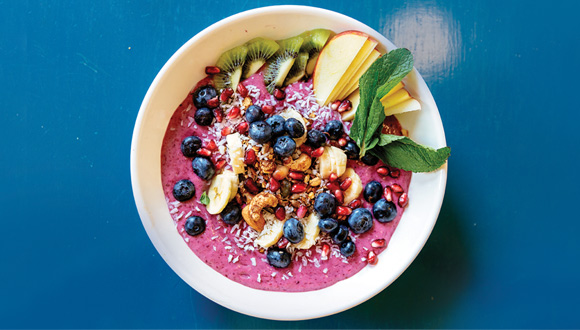Why Your Brain Needs a Balanced Breakfast (Plus, 7 Ideas to Help You Get Started)
Aug. 5, 2021 - Patti MuckBlue. Red. Green. Yellow. Raspberry. Orange.
To give your brain the healthiest fuel boost to start any day, envision a rainbow of vibrant food colors. Think a healthy bowl of red raspberries, green sliced kiwis and yellow chunks of sweet pineapple, with a big dab of plain nonfat yogurt on top, sprinkled with toasted walnuts and flax seeds.
Dr. Randall Wright, a neurologist at Houston Methodist, likes to think of "breakfast for the brain" as a rainbow moment in the day when we have the chance to fill our bodies with foods that give us a high-octane jump start, supplying energy, cognition and clarity to our brains for hours.
"Eating a rainbow of colors — just a variety of fresh fruits, vegetables, grains, nuts and seeds, and all the nutrition they offer — gives your brain the fuel it needs for the day," says Dr. Wright. "The brain is the highest energy-utilizing organ in our bodies. You feed it the right fuel, you really do it favors."
Remember the old saying, 'You are what you eat,' and realize that the traditional American diet — full of salt, sugar, saturated fats and empty calories — is no good for any part of our bodies, especially our brains.
The Global Council on Brain Health says people are never too old to benefit from dietary changes, which is why there's no time like right now.
"I'm too busy to worry about breakfast — my brain will have to wait"
Not good enough.
Dr. Wright is a clinician and busy family man with a wife and two children, ages 11 and 14, and they all eat breakfast, even on the busiest of days. As a self-described 'creature of habit,' Dr. Wright sticks to his classic breakfast of an egg and avocado sandwich on whole grain bread, sometimes eaten while driving to work. He tries to squeeze in a handful of fresh berries, too. If he's in a real hurry, he puts it all into a smoothie that is easier to drink while driving.
On special mornings, he may treat himself to a breakfast of salmon.
"My kids have gotten used to it — eggs every morning and fruit," he says. "We'll mix up the fruit and keep them interested — pineapple one day, berries the next."
And for those who just don't feel hungry when they wake up, waiting to eat is OK.
Intermittent fasting, says Dr. Wright, is beneficial to the brain. Skipping midnight snacks and going 12 to 14 hours without eating allows glucose levels in the body to drop, giving it a 'break' from eating — get it, Break Fast — and allows brain transmitters to cleanse themselves and reset.
Dr. Wright says it's OK to have black coffee and water — add a twist of lime for excitement — in those early morning hours before hunger kicks in.
Just don't opt for the easy, fast decision of stopping for a donut, kolache or other high carbohydrate, sugary breakfast item on the way to work. If a picture of a warm glazed donut dripping with sugar comes to mind, that's what NOT to eat.
"Yes, it will satisfy the tummy, but it's not going to make your brain happy," Dr. Wright says.
The brain is not designed to handle high volumes of glucose. A sugar load can start a vicious cycle of cravings and tempt people to eat a couple donuts, but then feel hungry again in no time. Glucose levels in the brain spike, then fall, then spike again.
Front-loading your food during the day — follow the "king, prince, pauper" model
In his most recent book Keep Sharp: Build a Better Brain at Any Age, neurosurgeon and CNN medical reporter Dr. Sanjay Gupta describes his philosophy on healthy eating as a front-loading model. Eat breakfast like a king; lunch like a prince; and dinner like a pauper, he advises.
Dr. Wright agrees: "We want to front-load our bodies with foods that will last throughout the day," he says. And don't forget about hydration. Sometimes we confuse hunger with thirst and just need 6 to 8 ounces of water to get going again. Our brains are primarily made of water, so even a little dehydration can impair our thinking, Dr. Wright warns.
In addition, the best breakfast for the brain needs two key ingredients that only you control: exercise and sleep. Both are critical to brain health.
"People who are active can have great brain power," Dr. Wright says. "Just the act of moving gets blood flowing to the brain." Equally important is the brain's need for enough sleep to recharge and get ready for the next day's estimated 6,000-plus thoughts coming its way. Aim for eight hours a night, and keep a consistent sleep/wake schedule.
7 perfect breakfasts for the brain
Dr. Wright offers these seven breakfast choices fit for a king or queen.
MONDAY: avocado/egg sandwich or avocado toast on whole wheat; berries on the side.
TUESDAY: oatmeal (prepared the night before) with blueberries and walnuts.
WEDNESDAY: salmon (cooked fresh or left over from dinner) with cut-up fruit on the side.
THURSDAY: cottage cheese topped with fresh cut peaches, seeds and nuts.
FRIDAY: make-it-yourself protein box with 2-3 slices cheese; grapes; almonds; whole wheat crackers; boiled egg.
SATURDAY: 2-egg omelette with a veggie rainbow of red, green, orange and yellow peppers, onions and sun-dried tomatoes.
SUNDAY: plain Greek yogurt filled with your favorite three fruits and topped with toasted walnuts and pecans.


